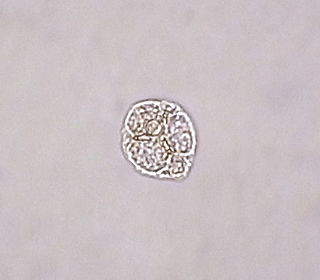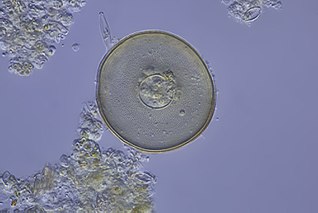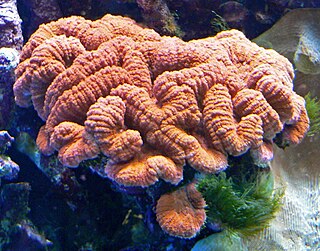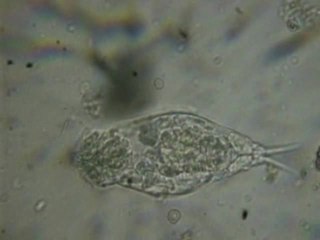
The Apioceridae, or flower-loving flies, are a small family of flies, all in the single genus Apiocera. They occur mostly in dry, sandy habitats in the deserts of North America, South America, and Australia. Other genera formerly placed in Apioceridae are now in Mydidae.

The Ebridea is a group of phagotrophic flagellate eukaryotes present in marine coastal plankton communities worldwide. Ebria tripartita is one of two described extant species in the Ebridea.
Members of this group are named for their idiosyncratic method of movement.

Trupanea is a genus of tephritid or fruit flies in the family Tephritidae.

Arcella is a genus of testate amoebae in the order Arcellinida, usually found in freshwaters and mosses, and rarely in soils. A key characteristic of Arcella is the circular test with a hole on its center from where finger-like pseudopods emerge. It is one of the largest testacean genera.

Dendrodoris is a genus of nudibranchs, marine gastropod molluscs in the family Dendrodorididae.

Lacrymaria is a genus of ciliates. Its best known species is the "Tear of Swan", Lacrymaria olor.

Anthothoe is a genus of sea anemones in the family Sagartiidae.

Chaetonotidae is a family of gastrotrichs in the order Chaetonotida. It is the largest family of gastrotrichs with almost 400 species, some of which are marine and some freshwater. Current classification is largely based on shape and external structures but these are highly variable. Molecular studies show a high level of support for a clade containing Dasydytidae nested within Chaetonotidae.
The genus Bacterium was a taxon described in 1828 by Christian Gottfried Ehrenberg. The type species was later changed from Bacterium triloculare to Bacterium coli as it was lost. In 1951 and then in 1954 it was recognised as a nomen generum rejiciendum, which means a generic name to be rejected; this also applied to its family Bacteriaceae.

Frontonia is a genus of free-living unicellular ciliate protists, belonging to the order Peniculida. As Peniculids, the Frontonia are closely related to members of the genus Paramecium. However, whereas Paramecia are mainly bacterivores, Frontonia are capable of ingesting large prey such as diatoms, filamentous algae, testate amoebas, and even, in some circumstances, members of their own species. In bacteria-rich saprobic conditions, Frontonia leucas can live as a facultative bacterivore.

Lobophyllia, commonly called lobed brain coral or lobo coral, is a genus of large polyp stony corals. Members of this genus are sometimes found in reef aquariums.

Heteroxenia is a genus of soft corals in the family Xeniidae.

Anthelia is a genus of soft corals in the family Xeniidae.

Cephalodella is a genus of rotifers in the family Notommatidae.

Tephritini is a tribe of fruit flies in the family Tephritidae. There are about 12 genera and at least 40 described species in Tephritini.
Notommata is a genus of rotifers belonging to the family Notommatidae.
Monommata is a genus of rotifers belonging to the family Notommatidae.

Euchlanis is a genus of rotifers belonging to the family Euchlanidae.
Eosphora is a genus of rotifers belonging to the family Notommatidae.

Proales is a genus of rotifers belonging to the family Proalidae.















